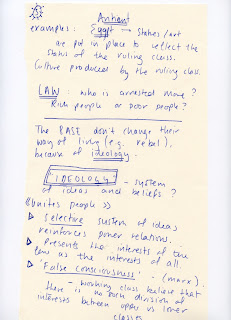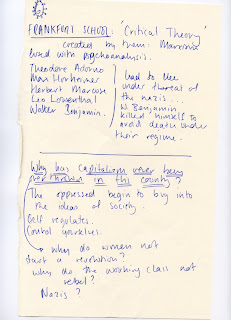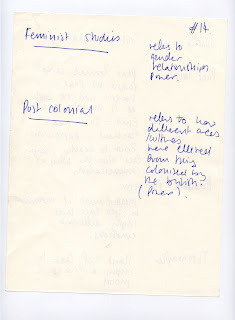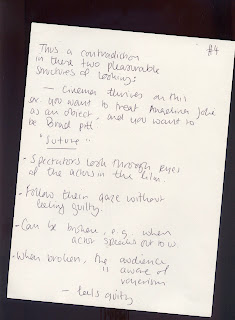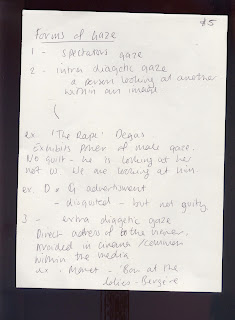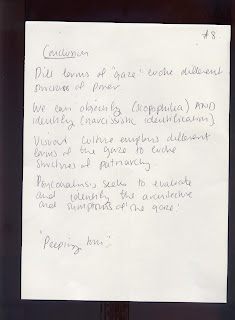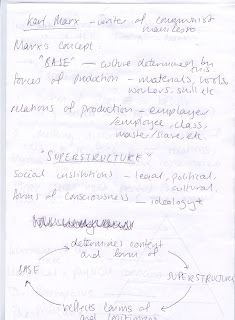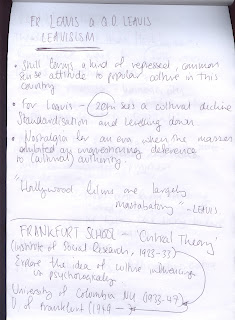Tuesday 30 November 2010
Thursday 25 November 2010
Monday 15 November 2010
Task 1 - Panopticism in contemporary society
Elements of the way in which smoking is controlled and regulated could be compared to Panopticism in the context of contemporary society. This is illustrated in the way that we behave in response to signage and other visual reminders prompting us not to smoke and messages reinstating the consequences of our actions should we be caught committing them. This is the perfect example of ‘automatic functioning of power’ (Foucault, 1977). We do not necessarily need to see anyone on site policing the situation but most of us consider the risk and feel fearful of being caught so refrain from smoking accordingly. In this sense we are self-regulating.
There are multiple day-to-day surveillance measures and strategies such as closed circuit television and open plan civic engineering installed in our society to protect us. However at the same time this ‘visibility is a trap’(Foucault, 1977). The constant surveillance installs enough fear and awareness to control our behavior.
Another way that smokers are regulated is by our peers. Constant government led campaigns reinforce the message that smoking is an extremely negative life choice. The government implements pathos to pull at the heartstrings of the masses, when realistically the government wants to promote the docile body because it is far more beneficial to their ideal society. As a result, non-smokers regulate the smokers by the judgment they bestow on them, enforcing a feeling of shame.
The health service is required to ask us as a process of administration the question; Are you a smoker? This is but one of many situations throughout your life where you are required to answer this question. Even when you have quit, you will be registered as an ‘ex-smoker’. This ‘permanent registration’(Foucault, 1977) and negative attention enforced by the government install a sense of guilt in the smoker, again making them self-regulate and feel pressured into quitting. Effectively, being a smoker becomes a sub category of being human
Another example of this ‘binary division and branding’(Foucault, 1977) is the ban on smoking in public spaces. The ban requires smokers to smoke in areas specifically for them. This creates a literal separation between those who smoke and those who do not. A more extreme version of this can be seen in the concept of smoking booths; while slightly alien to the United Kingdom are very well established in Europe and other areas of the world. In these booths the smoker is confined to a small enclosure perhaps only large enough for one person, often glass so that they can actually see other smokers and passers by, but cannot communicate with them, eliminating any social pleasure in the experience. In this situation the smoker can simply have their cigarette with only the hum of the extractor fan to keep them company. This feeling of ‘enclosure, rejection’ (Foucault, 1977) and loneliness reflects that of a leper.
Bibliography
Book:
Michel Foucault, (1977) Discipline and Punish, London, Penguin
Thursday 11 November 2010
Tuesday 9 November 2010
Leeds film festival : Waking up in a surveillance society
I though that this film was particularly releveant to the lecture the other day and definitely worth going to see.
Article 12 presents an urgent and incisive deconstruction of the current state of privacy, the rights and desires of individuals and governments, and the increasing use of surveillance. The film adopts the twelfth article of the Universal Declaration of Human Rights to chart privacy issues worldwide, arguing that without this right no other human right can truly be exercised. It assembles leading academics and cultural analysts including Noam Chomsky, AC Grayling and Amy Goodman to highlight the devastating potency of surveillance, the dangers of complicity, and the growing movement fighting for this crucial right.
Read more: http://www.leedsfilm.com/film/article-12-waking-up-in-a-surveillance-society/#ixzz14oaraVkp
Article 12 presents an urgent and incisive deconstruction of the current state of privacy, the rights and desires of individuals and governments, and the increasing use of surveillance. The film adopts the twelfth article of the Universal Declaration of Human Rights to chart privacy issues worldwide, arguing that without this right no other human right can truly be exercised. It assembles leading academics and cultural analysts including Noam Chomsky, AC Grayling and Amy Goodman to highlight the devastating potency of surveillance, the dangers of complicity, and the growing movement fighting for this crucial right.
Read more: http://www.leedsfilm.com/film/article-12-waking-up-in-a-surveillance-society/#ixzz14oaraVkp
Thursday 4 November 2010
Subscribe to:
Posts (Atom)



